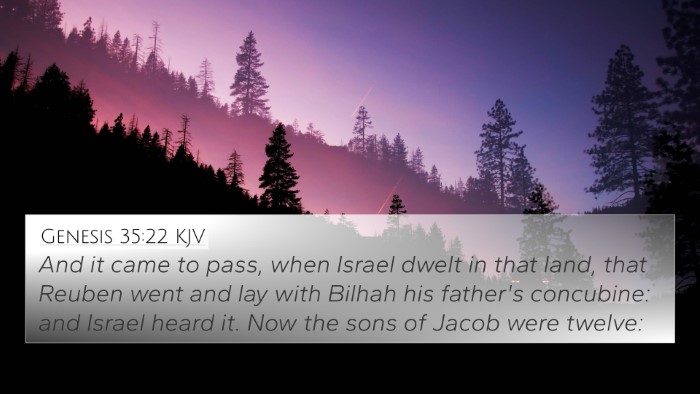Understanding Exodus 1:2
Bible Verse: Exodus 1:2: "Simeon, Levi, Judah, Issachar, Zebulun, and Benjamin."
Verse Overview
This verse presents a list of the names of Jacob's sons who became the heads of the tribes of Israel. These names hold significance as they not only identify the tribal lineage but also illustrate the fulfillment of God's promise to multiply Jacob's descendants.
Commentary Insights
Commentators such as Matthew Henry, Albert Barnes, and Adam Clarke provide rich interpretations of this verse, emphasizing various themes:
- Covenant Fulfillment: The mentioning of these tribes reflects God's covenant promise to Abraham, Isaac, and Jacob, illustrating the continuity of God's plan through generations.
- Significance of Names: Each name carries meaning; for example, Judah is associated with praise, indicating how worship and leadership are intertwined in the future of Israel.
- Foundation of the Nation: This passage establishes the foundation of the Israelite nation through the sons of Jacob, pivotal for understanding subsequent events in Exodus.
Bible Cross-References
Exodus 1:2 contains multiple connections to other scripture texts:
- Genesis 29:32-35 - Births of Jacob’s sons and their names’ significance.
- Genesis 49:1-28 - Jacob's blessings to his sons and prophecy concerning the tribes.
- Matthew 1:2-16 - The genealogy of Jesus Christ, linking back to these tribes.
- Hebrews 7:14 - Jesus’ lineage from the tribe of Judah emphasizes its importance.
- Revelation 7:5-8 - The listing of the tribes of Israel, showing ongoing significance.
- Deuteronomy 33:6-25 - Moses’ blessings on the tribes, reinforcing their roles.
- Acts 7:8 - Stephen references the twelve patriarchs, connecting with Exodus 1:2.
Thematic Bible Verse Connections
The themes expressed in Exodus 1:2 resonate throughout the Bible:
- Promised Land: Links to Genesis 12:7, where God promises the land to Abraham’s descendants.
- Divine Providence: Connections to passages like Romans 8:28 showcasing God’s orchestration through history.
- Identity and Heritage: Reflected in the importance of family lineage throughout the Old Testament.
Cross-Referencing Scripture Study
When considering how to utilize Bible cross-references effectively:
- Tools for Bible Cross-Referencing: Utilizing a Bible concordance or cross-reference guide can enhance understanding.
- How to Use Bible Cross-References: Look for patterns in the text that lead to a deeper comprehension of themes.
- Identifying Connections: Recognize parallels between Old Testament stories and New Testament fulfillments.
Conclusion
In conclusion, Exodus 1:2 serves as a foundational verse that bridges the historical narratives and theological themes central to the Bible. Its connections to the lineage of Israel, covenant promises, and eventual fulfillment in Christ provide a rich tapestry for study and devotion.



